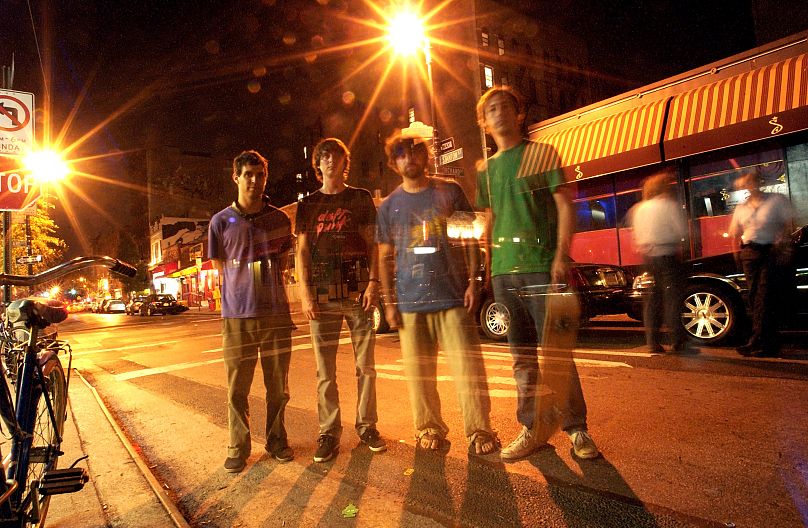Animal Collective are just the latest high-profile artist to pull a tour post-Covid because of spiralling inflation.
Not every band is as lucky as punk rockers Blink 182 or 90s rock darlings Pavement, who have announced that they are reuniting for worldwide tours...
American experimental pop band Animal Collective have had to cancel their upcoming European tour because they “could not make a budget for this tour.”
The cancellation has sparked renewed conversation about the financial realities of leading a successful musical career today.
Animal Collective are one of the most successful experimental bands still touring today. Founded in 1999, they have achieved critical and commercial success, particularly with their 2009 album ‘Merriweather Post Pavilion’.
The news that they were cancelling their European tour was a complete surprise to fans.
In the Instagram post announcing the cancellation, they explained their reasoning.
After years spent losing income not touring because of COVID, the band was excited to get back on the road for UK and EU dates. Despite band members contracting the virus and having to cancel dates previously, Animal Collective had pushed through because “we have had an incredible time playing music in front of our fans at every show.”
“But preparing for this tour we were looking at an economic reality that simply does not work and is not sustainable,” the band explains.
Inflation, currency devaluation, bloated shipping and transportation costs were among the reasons that they couldn’t find a way to make a tour that they wouldn’t lose money with.
“We are choosing not to take the risk to our mental and physical health with the economic reality of what that tour would have been,” they say.
They finish the post hoping to one day tour again and offering full refunds to anyone with tickets.
An industry in danger?
The news that such a successful band can’t make a tour profitable is a worrying sign for an industry that has already gutted many revenue streams for artists.
Drew Daniel, a member of experimental electronic duo Matmos responded they were “glad Animal Collective spoke up about the realities of touring now.” He noted the group’s dedication to paying their team properly as part of the reason the “margins don’t work anymore.”
Other fans on Twitter have expressed their concern that if Animal Collective can’t make a tour work, what hope is there for smaller artists?
In July, the UK’s music industry demanded politicians work to make touring in the EU feasible again after Brexit created expensive restrictions.
The end of free movement has made EU tours for smaller artists financially prohibitive.
UK rock band White Lies then explained that they cancelled a Paris gig after increased red tape delayed equipment arriving.
“We have the resources to pay experienced professionals to guide us through the red tape, but the reality for newer acts is that touring in Europe could become an impossible dream,” White Lies singer Harry McVeigh said.
For the past two years, bands and musicians have had to put touring on hold while the world went through multiple rounds of lockdowns. As most of the money music acts make is through touring, the relaxation of restrictions was a hopeful moment.
But the risk of cancelling shows because of crucial team members contracting coronavirus has continued to impose heavy financial risks on touring musicians.
“If one of our stadium acts loses a show, that can be a $3mn, $4mn, $5mn hit in expenses, because of everything from stadium rentals, to having flown in and spent five days constructing the set, to ticket refunds,” Bill Zysblatt, tour manager to Lady Gaga, the Rolling Stones and Shania Twain told the Financial Times.
Europe is also a more expensive place to tour than it was in 2019. Rising inflation has reduced margins for bands, pushing them to breaking point.
In September, American singer Santigold cancelled her upcoming tour for similar reasons to Animal Collective.
“As a touring musician, I don’t think anyone anticipated the new reality that awaited us,” she wrote.
“We were met with the height of inflation - gas, tour buses, hotels and flight costs skyrockets - many of our tried-and-true venues unavailable due to a flooded market of artists trying to book shows in the same cities, and positive test results constantly halting schedules with devastating financial consequences.”
“Some of us are finding ourselves simply unable to make it work,” she explained.
There has also been intense conversation about the role of streaming platforms in making it harder for musicians to make a living today.
Future for Music Coalition (FMC), a US non-profit organisation supporting the musical ecosystem has hit out against the streaming model gutting profits from artists.
In a recent thread, FMC detailed findings they made a decade ago about the way the industry was changing.
Traditional record deals with labels cover their recording costs, but touring is a cost the artists have to shoulder themselves. The bigger the tour, the bigger the financial risk to the artist.
This means, when touring breaks down as it did in 2020, artists lose a crucial revenue stream.
With inflation continuing to reduce touring margins, being a career musician is an ever more precarious career.












